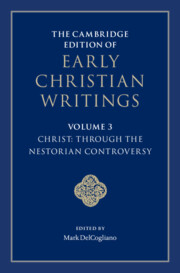Book contents
- The Cambridge Edition of Early Christian Writings
- The Cambridge Edition of Early Christian Writings
- The Cambridge Edition of Early Christian Writings
- Copyright page
- Contents
- Notes on Contributors
- Acknowledgments
- Note on the Texts and Translations
- Abbreviations
- Series Introduction
- Introduction
- Part I The Beginnings of Christology
- Part II Developing Christological Traditions
- Part III Traditions of Pro-Nicene Christology
- 21 Tome to the Antiochenes 7
- 22 Athanasius of Alexandria, Christological Letters to Epictetus, Adelphius, and Maximus
- 23 Apollinarius of Laodicea, Recapitulation
- 24 Apollinarius of Laodicea, Selected Letters
- 25 Apollinarius of Laodicea, On the Faith and the Incarnation
- 26 Apollinarius of Laodicea, On the Body’s Union with the Divinity in Christ
- 27 Apollinarius of Laodicea, Fragments of Other Writings
- 28 Apollinarius of Laodicea, Fragmentary Writings against Diodore and Flavian
- 29 Basil of Caesarea, Letters 261 and 262
- 30 Basil of Caesarea, Homily on the Holy Birth of Christ
- 31 Diodore of Tarsus, Selected Fragments
- 32 Gregory of Nazianzus, Letter 101 to Cledonius
- 33 Gregory of Nazianzus, Poems 1.1.10–11
- 34 Gregory of Nyssa, Oration on the Savior’s Nativity
- 35 Theodore of Mopsuestia, On the Incarnation of the Lord against the Apollinarians and Eunomians (Fragments)
- 36 Augustine of Hippo, On Eighty-Three Different Questions. Number 80: Against the Apollinarians
- 37 Augustine of Hippo, Letter 137
- 38 The Leporius Dossier
- 39 Theodoret of Cyrrhus, Exposition of the Orthodox Faith
- Part IV Controversy over Nestorius
- Suggestions for Further Reading
- Scriptural Index
30 - Basil of Caesarea, Homily on the Holy Birth of Christ
from Part III - Traditions of Pro-Nicene Christology
Published online by Cambridge University Press: 05 February 2022
- The Cambridge Edition of Early Christian Writings
- The Cambridge Edition of Early Christian Writings
- The Cambridge Edition of Early Christian Writings
- Copyright page
- Contents
- Notes on Contributors
- Acknowledgments
- Note on the Texts and Translations
- Abbreviations
- Series Introduction
- Introduction
- Part I The Beginnings of Christology
- Part II Developing Christological Traditions
- Part III Traditions of Pro-Nicene Christology
- 21 Tome to the Antiochenes 7
- 22 Athanasius of Alexandria, Christological Letters to Epictetus, Adelphius, and Maximus
- 23 Apollinarius of Laodicea, Recapitulation
- 24 Apollinarius of Laodicea, Selected Letters
- 25 Apollinarius of Laodicea, On the Faith and the Incarnation
- 26 Apollinarius of Laodicea, On the Body’s Union with the Divinity in Christ
- 27 Apollinarius of Laodicea, Fragments of Other Writings
- 28 Apollinarius of Laodicea, Fragmentary Writings against Diodore and Flavian
- 29 Basil of Caesarea, Letters 261 and 262
- 30 Basil of Caesarea, Homily on the Holy Birth of Christ
- 31 Diodore of Tarsus, Selected Fragments
- 32 Gregory of Nazianzus, Letter 101 to Cledonius
- 33 Gregory of Nazianzus, Poems 1.1.10–11
- 34 Gregory of Nyssa, Oration on the Savior’s Nativity
- 35 Theodore of Mopsuestia, On the Incarnation of the Lord against the Apollinarians and Eunomians (Fragments)
- 36 Augustine of Hippo, On Eighty-Three Different Questions. Number 80: Against the Apollinarians
- 37 Augustine of Hippo, Letter 137
- 38 The Leporius Dossier
- 39 Theodoret of Cyrrhus, Exposition of the Orthodox Faith
- Part IV Controversy over Nestorius
- Suggestions for Further Reading
- Scriptural Index
Summary
Among other things Basil of Caesarea was renowned for his preaching.1 Both as a presbyter and then a bishop, he preached on a regular basis on the various Sundays, feasts, and celebrations of the church’s liturgical calendar, as well as at synods and other ecclesiastical gatherings. Only about fifty of his homilies are extant, one of which is his Homily on the Holy Birth of Christ. Some scholars claim it is one of the earliest witnesses to the celebration of Christmas on December 25, but if not, it was probably preached on January 6 in celebration of the feast of the Theophany (also known as Epiphany). The year cannot be determined with any precision, but Basil probably delivered it during his episcopacy, 370–378, which is roughly the same period in which Letters 261 and 262 were written.
- Type
- Chapter
- Information
- The Cambridge Edition of Early Christian Writings , pp. 354 - 365Publisher: Cambridge University PressPrint publication year: 2022

